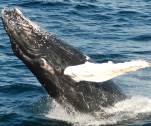IPC Port-of-Call: Spotlight on the Westman Islands
October 7, 2023 - 2 minutes readLocated off the south coast of Iceland, a shore excursion in the remote — and very volcanic — Westman Islands (Vestmannaeyjar) affords Iceland ProCruise passengers a chance to appreciate nature is its purest form during the popular “Iceland Circumnavigation” cruises that sail around the island each summer.
Heimaey is the only one of the archipelago’s 15 islands with year-round human inhabitants. Most 4,100 residents live in the main town, Vestmannaeyjabær. The archipelago’s volcanic system consists of 70 to 80 volcanoes both above and below the sea. As a result, the people of Heimaey live in constant fear of eruption.
The last major eruption in 1973 — which lasted 155 days — destroyed half of the town but expanded the size of Heimaey island by almost a square mile. In the black-lava-covered area east of town, monuments and ruined structures show what was there before the eruption, a persistent reminder that it could happen again at any time.
The climate of the Westmans is rainy and windy. But the Gulf Stream flowing past warms the local air and the archipelago has the country’s highest average annual temperature. It’s especially cozy in winter.
Despite its relative isolation, there’s actually lots for visitors to do on Heimaey. Activities range from self-guided hikes and bike rides around the island to adventurous tours curated by locals in boats, cars or buses.
Visitors can learn more about the islands at the Folk Museum Sagnheimar and Sæheimar Aquarium & Natural History Museum, as well as the Volcano Museum Eldheimar, which details the 1973 outburst and the famous Surtsey eruption of 1963-1967 that created an entirely new island.
Local restaurants serve quality dishes with ingredients grown on the islands or caught in the surrounding sea. The Westmans boast some of the North Atlantic’s richest fishing grounds, with cod and haddock being the most pervasive species.
There’s also wildlife watching. The archipelago’s steep cliffs and lush vegetation provide a home to more than 30 avian species, birds that nest in the cliffs and grassy ledges. There are also around 150 plant species and 80 types of insect. Seals, whales and other marine life are abundant offshore.

0 Comments